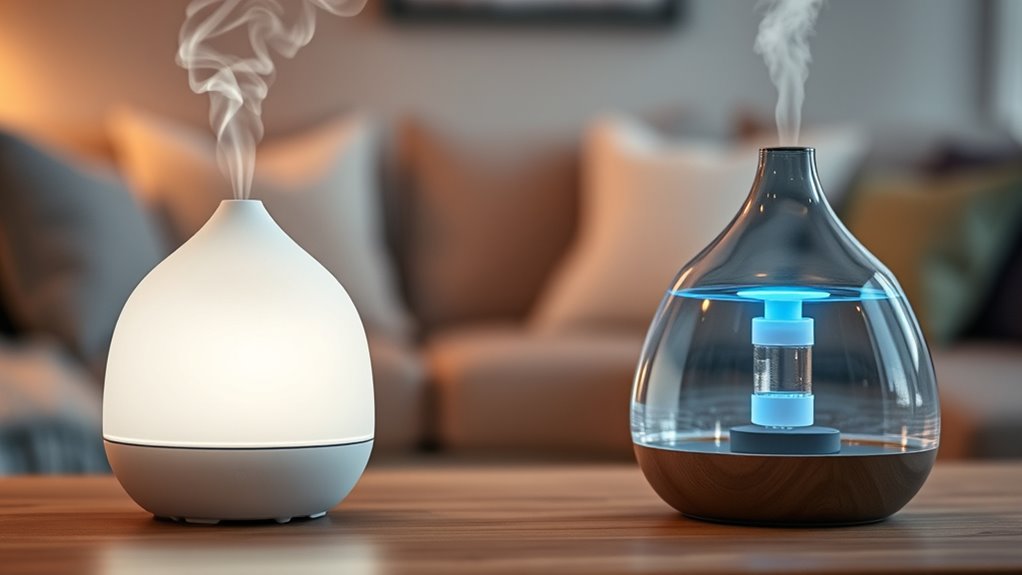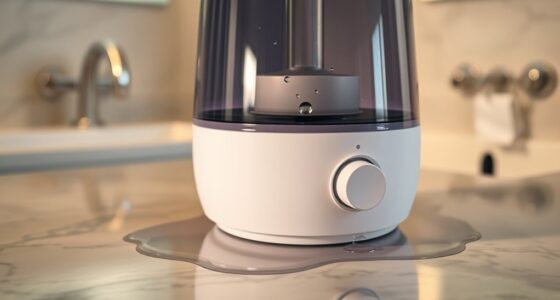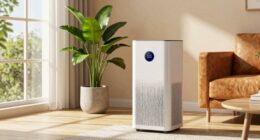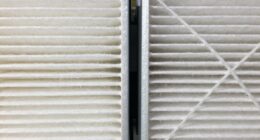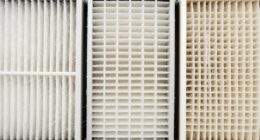Diffusers and humidifiers are not the same, though they might look similar. Diffusers disperse essential oils into the air to improve mood and relaxation, while humidifiers add moisture to fight dry air and respiratory issues. Diffusers focus on scent, and humidifiers on moisture. Using each correctly can enhance your environment. If you’re curious about how they work together or their specific benefits, there’s more to explore below.
Key Takeaways
- Diffusers disperse essential oils into the air for aromatherapy, while humidifiers increase indoor moisture levels.
- Diffusers primarily focus on scent distribution; humidifiers mainly add water vapor to improve air humidity.
- Diffusers do not significantly affect humidity; humidifiers do not disperse scents unless designed for scent pads.
- Both devices support healthier indoor environments but serve different functions—aroma vs. moisture.
- Proper use requires understanding each device’s purpose; they are not interchangeable.

Diffusers are primarily used for aroma therapy. They disperse essential oils into the air, filling your space with calming or invigorating scents. This process not only enhances your mood but can also promote relaxation or focus. You activate a diffuser by adding a few drops of essential oil to its water reservoir, and then it uses ultrasonic vibrations or heat to turn the mixture into a fine mist. This mist carries the aroma throughout the room, providing a sensory experience that can improve your well-being. Keep in mind that diffusers don’t substantially affect the air moisture levels; their main function is scent dispersal.
Diffusers disperse essential oils into the air, enhancing mood with calming or invigorating scents without significantly affecting humidity.
Humidifiers, on the other hand, focus on increasing air moisture levels. They add water vapor to dry indoor air, which can be especially helpful during winter months or in arid climates. When you use a humidifier, it releases a fine mist or vapor to maintain ideal humidity, typically between 30% and 50%. Proper humidity helps prevent dry skin, irritated sinuses, and respiratory discomfort. Unlike diffusers, humidifiers don’t require essential oils and aren’t designed to distribute scents, although some models may have optional scent pads. Their primary role is to improve air quality by balancing moisture levels, making your environment healthier and more comfortable.
It’s important to recognize that diffusers and humidifiers aren’t interchangeable. Using a diffuser solely for humidifying the air won’t be effective and can even damage the device. Conversely, a humidifier won’t provide the aromatic benefits you get from a diffuser. If you want both scent therapy and humidity control, you might consider a device that combines both functions or use separate appliances tailored to each purpose.
Additionally, understanding the air quality benefits of proper humidity levels can help you create a healthier indoor environment.
Frequently Asked Questions
Can Diffusers Help With Allergies or Respiratory Issues?
Diffusers can help with allergies or respiratory issues by releasing essential oils that promote relaxation and air purification. While aroma therapy with diffusers may reduce airborne allergens and soothe breathing, they don’t add moisture like humidifiers do. Using a diffuser alongside proper cleaning can improve air quality and support respiratory health, making it easier to breathe, especially during allergy season or respiratory discomfort.
Are There Safety Concerns With Using Diffusers Around Pets?
You might worry about pet safety around diffusers, but with proper use, risks are minimal. Keep oils out of your pets’ reach, as oil toxicity can cause serious health issues. Always choose pet-safe essential oils and run diffusers in well-ventilated areas. By being cautious, you protect your furry friends and enjoy the benefits of aromatherapy without risking their health.
How Often Should I Clean My Humidifier or Diffuser?
You should clean your humidifier or diffuser at least once a week to prevent mold and bacteria buildup. Regular maintenance tips include emptying the water tank daily, rinsing thoroughly, and drying all parts completely. For maximum performance and safety, adjust the cleaning frequency based on usage; if you notice any mold or a musty smell, clean it immediately. Consistent cleaning ensures healthy, fresh mist and prolongs your device’s life.
Do Diffusers or Humidifiers Improve Sleep Quality?
Using a diffuser can improve your sleep environment by releasing calming scents through aromatherapy benefits, helping you relax and fall asleep faster. While humidifiers add moisture to the air, they don’t provide the same aromatherapy benefits. Diffusers promote better sleep quality by creating a soothing atmosphere, whereas humidifiers mainly prevent dryness. Incorporate a diffuser into your nightly routine to enhance your sleep environment naturally.
Are Essential Oils Safe to Use in Humidifiers?
They say, “Better safe than sorry,” and that’s true when it comes to oil safety in humidifiers. Not all diffuser types are meant for essential oils, and using the wrong one could damage your device or cause health issues. Always check your humidifier’s instructions before adding oils. If it’s compatible, use high-quality, pure essential oils in moderation for safe, soothing aromatherapy.
Conclusion
While diffusers and humidifiers serve different purposes, both can enhance your space. Some worry they might be unnecessary or interchangeable, but understanding their unique benefits helps you choose what’s right for you. Whether you want calming scents or added moisture, investing in the right device improves your comfort and well-being. Don’t overlook their value—your environment and health will thank you for it. So, pick what suits your needs and enjoy a more comfortable, inviting space.
